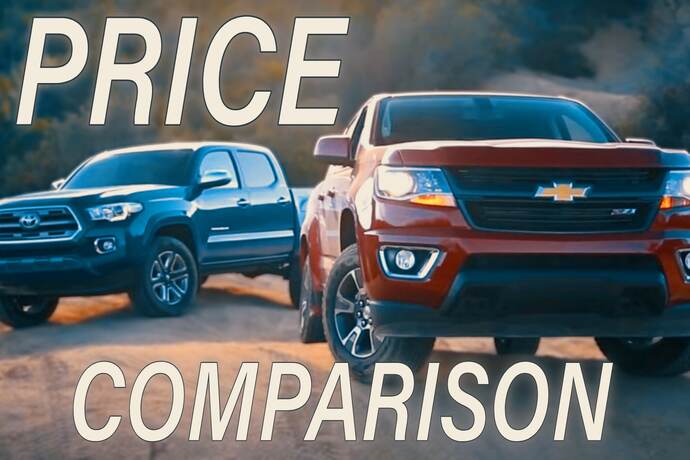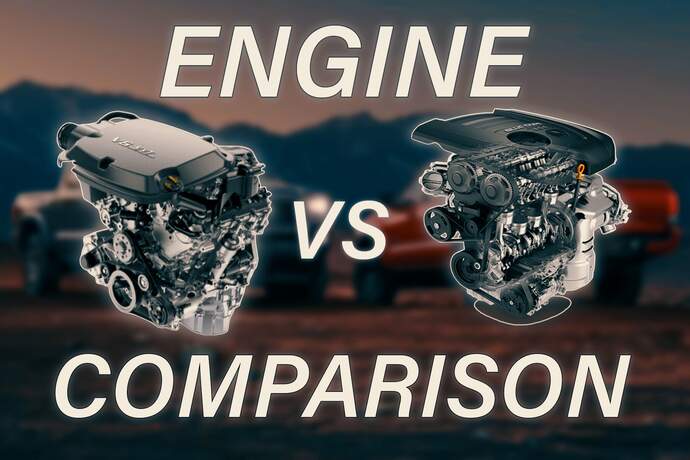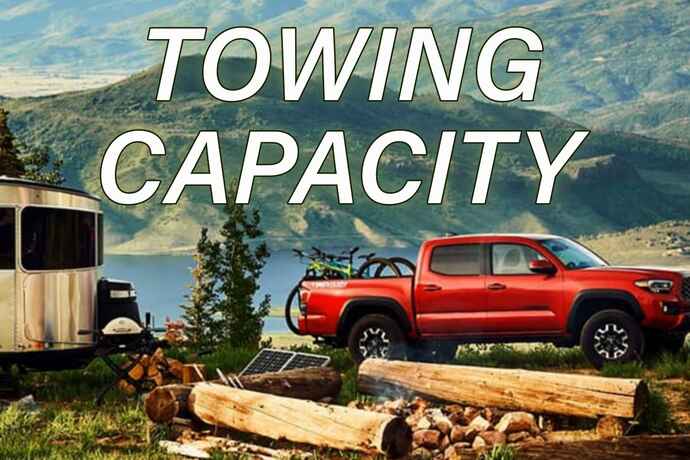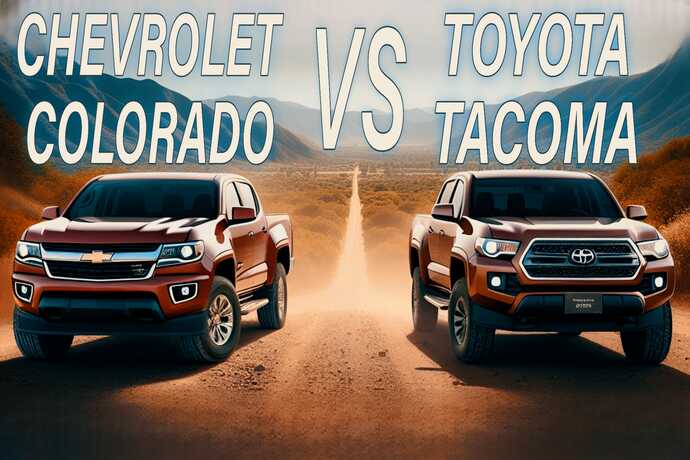The Chevy Colorado and Toyota Tacoma are both popular and feature-rich pickup trucks.
If you are looking for a mid-size, off-road-capable truck, you may be interested in both.
These two trucks are among the most popular and competitive models in the price segment.
However, they have some notable differences in design, performance, features, and price.
You should know about the trucks before purchasing them or making any decisions.
In this article, I will discuss the 12 main comparisons and differences between the Chevy Colorado and Toyota Tacoma, which will help you decide between them.
Let’s compare the Chevy Colorado vs Toyota Tacoma in terms of price, size, engine, transmission, performance, mpg, towing capacity, interior, safety, and warranty. I will discuss the 2024 model year of the Chevy Colorado and Toyota Tacoma.
Read also about the difference between GMC Sierra and Chevy Silverado.
1. Chevy Colorado vs Toyota Tacoma Price

The Chevy Colorado WT starts at $31,095, whereas the Toyota Tacoma SR begins at $32,995. So, base-level Colorados are $1900 cheaper compared to the Tacoma.
Mid-level Colorado LT, Trail Boss, Z71, and ZR2 cost $33,495, $38,895, $41,795, and $48,395, respectively. On the other hand, mid-level Tacoma SR5, TRD Prerunner, TRD Sport, TRD Off-road, Limited, and Tailhunter cost $37,695, $39,595, $40,895, $43,295, $53,595 and $57,000 (est.), respectively.
When it comes to the mid-level trims, the Chevrolet Colorado has a pricing range that is cheaper compared to the Tacoma.
However, the highest trim of the Colorado is $4460 cheaper than the highest trim of the Toyota Tacoma. So, the highest trim of the Colorado is $4460 cheaper than the highest trim of the Toyota Tacoma.
Overall, the Chevy Colorado is more affordable compared to the Toyota Tacoma.
2. Chevy Colorado vs Toyota Tacoma Size
The Chevy Colorado is 212.7 inches long, 74.3 inches wide, and 70.6 inches tall. On the other hand, the Toyota Tacoma is 212.3 inches long, 74.4 inches wide, and 70.6 inches tall.
It implies that the Colorado is a bit longer compared to the Tacoma, but the Tacoma is slightly broader than the Colorado. However, both of the trucks have the same height.
The Chevrolet Colorado comes with a wheelbase of 128.3 inches, whereas the 2024 Toyota Tacoma features a wheelbase of 127.4 inches.
It means that the Colorado has a larger wheelbase than the Tacoma, which can affect the driving and handling of the trucks.
3. Chevy Colorado vs Toyota Tacoma Engine Comparison

Chevy Colorado offers three engine choices, all of which are 2.7L inline-four cylinders with turbocharging. It can produce 237 hp and 259 lb-ft of torque with the standard configuration. Turbo Plus increases the performance to 310 hp and 390 lb-ft of torque. A standard software feature, Turbo HO in the ZR2 trims, boosts the torque to 430 lb-ft.
The Toyota Tacoma offers two engine variants: a standard 2.4L inline four-cylinder and an i-Force Max hybrid. The standard 2.4L I4 produces 228 hp and 243 lb-ft of torque on the entry-level SR model and 278 hp and 317 lb-ft of torque on higher trims. The i-Force Max hybrid powertrain has a 2.4-liter gas engine with an electric motor and a compact battery. It can generate 326 hp and 465 lb-ft of torque.
You can see that the Chevy Colorado offers greater horsepower and torque in the standard engine variants than the Toyota Tacoma. Also, Colorado offers more engine variants to choose from. However, the hybrid engine of the Tacoma produces more horsepower and torque.
Colorado is a good choice if you are looking for a pickup truck with a standard powertrain. But the Tacoma hybrid would be a better choice if you’re looking for performance and fuel efficiency.
4. Chevy Colorado vs Toyota Tacoma Transmission
The Chevy Colorado has an eight-speed automatic transmission for all its 2.7L I4 engines.
Standard Colorado setups can generate a maximum of 237 hp and 259 lb-ft of torque, which can be increased to 310 hp and 430 lb-ft of torque.
On the other hand, the Toyota Tacoma comes with a six-speed manual transmission or an eight-speed automatic transmission for the 2.4L I4 standard and hybrid engines.
The Tacoma standard setup can produce 228 hp and 243 lb-ft of torque. Other setups can generate up to 278 hp with 317 lb-ft of torque.
The i-Force Max hybrid powertrain can boost performance with up to 326 hp and 465 lb-ft of torque.
You can see that the Chevy Colorado has a simple but reliable transmission system, whereas the Toyota Tacoma offers two varieties of transmission, which is a good point. Also, Tacoma offers a hybrid option, which provides more power and efficiency. So, Tacoma leads in terms of transmission varieties.
5. Chevy Colorado vs Toyota Tacoma 0-60

The basic Chevy Colorado engine can reach 0–60 mph in 9.1 seconds with the RWD and 9.5 seconds with the 4WD. Colorado’s Turbo Plus engine variants can reach 0–60 mph in 7.1 seconds with the RWD and 7.4 seconds with the 4WD. The Turbo HO engine can reach 0–60 mph in 6.9 seconds with the RWD and 7.2 seconds with the 4WD configuration.
On the other hand, the basic Toyota Tacoma engine can reach 0–60 mph in 9.4 seconds with RWD and 9.8 seconds with 4WD. The hybrid Tacoma engine can reach 0–60 mph in 7.0 seconds with RWD and 7.3 seconds with the 4WD configuration.
As you can see, basic Colorado engines can reach 0–60 mph 0.3 seconds faster than the basic Tacoma engines. Also, the Colorado’s lowest 0–60 mph time is 0.1 second less than that of the Tacoma.
So, the Chevy Colorado is faster at 0–60 mph than the Toyota Tacoma.
6. Chevy Colorado vs Toyota Tacoma MPG
The RWD Colorado models have the highest EPA fuel economy rating of 20 mpg in urban areas, 25 mpg on highways, and 22.5 mpg combined. The 4WD Colorados have an estimated fuel economy of 19 mpg in the city areas, 23 mpg on the highways, and 21 mpg combined. For the ZR2 off-road edition, the fuel economy falls to 17 mpg in cities, 19 mpg on highways, and 18 mpg combined.
On the other hand, Toyota Tacoma RWD trims have 20 mpg in the city, 24 mpg on the highway, and 22 mpg combined. The 4WD Tacomas have an estimated fuel economy of 19 mpg in city areas, 23 mpg on highways, and 21 mpg combined. The TRD off-road edition gets 19 mpg in urban areas, 23 on highways, and 21 mpg combined.
Here, RWD Colorados give the same mileage in city areas but one mile more on the highways and 0.5 mpg more combined. But the 4WD Colorado variants get the same mileage compared to the Tacoma. And for the off-road variants, Tacoma gets 2 miles more in cities, 4 miles more on highways, and 3 mpg more combined.
So, the Chevy Colorado’s mileage is slightly better in RWD and the same in 4WD compared to the Toyota Tacoma. But the Toyota Tacoma’s mileage is better off-road than that of the Chevy Colorado.
7. Chevy Colorado vs Toyota Tacoma Towing Capacity

When appropriately equipped, the Chevy Colorado has a maximum cargo capacity of 1,578 pounds.
Depending on the model and configuration, Colorado’s maximum towing capacity changes. The Trail Boss and Z71 versions can tow up to 7,700 pounds.
On the other hand, the maximum cargo capacity of the Toyota Tacoma is 1,709 pounds.
The towing capacity varies across the trims, but the maximum towing capacity of the Tacoma is 6,500 pounds.
As you can see, the cargo capacity of the Toyota Tacoma is 131 pounds higher than that of the Chevy Colorado. But the towing capacity of the Colorado is much higher than that of the Tacoma. The Chevy Colorado can tow 1,200 pounds more compared to the Toyota Tacoma.
So, the Chevy Colorado is the better choice for towing capacity.
8. Chevy Colorado vs Toyota Tacoma Interior
The Colorado’s cabin provides plenty of legroom, with 45.2 inches up front and 34.7 inches behind the wheel. There is 40.3 inches of headroom up front and 38.3 inches in the back. Up to five passengers can sit in the crew cab. There is also standard cloth upholstery. The driver’s seat has a six-way manual adjuster, whereas the passenger’s has four. Inside, you’ll find a redesigned center console, a repositioned shifter closer to the cab’s passenger side, and rearranged cupholders just in front of that. A new steering wheel, infotainment screen, and instrument cluster complete the refreshed look.
On the other hand, Tacoma’s cabin provides a front headroom of 41.8 inches and a rear legroom of 33.7 inches. There is 39.7 inches of headroom up front and 34.9 inches in the back. The different cab versions can seat four passengers. Other features include smart storage, a convertible JBL speaker, a 14-inch infotainment screen, more cargo space for 2-door variants, performance seats with an isodynamic damping system, a power moonroof, a back seat fold-flat feature, folding passenger seats with a bottle holder, a digital rearview mirror, an integrated shelf within the instrument cluster, etc.
Here, the Chevy Colorado has more head and legroom and better seating capacity than the Toyota Tacoma. But Tacoma has more internal features that exceed those of Colorado.
9. Chevy Colorado vs Toyota Tacoma Safety

Standard safety features of the 2024 Chevrolet Colorado include automatic high beams, lane keep assist and automated emergency braking. The NHTSA gave Colorado 4 out of 5 stars in the frontal and 5 out of 5 stars in the side crash tests.
Toyota Safety Sense 3.0 is standard on all Tacoma models. Toyota’s active safety and convenience systems include forward collision warning, automated emergency braking, lane-departure warning, and lane-keeping assist. There are also intersection safety features and proactive driver assistance features. It is considered one of the safest pickup trucks.
So, the Chevy Colorado and Toyota Tacoma both have leading safety features.
10. Chevy Colorado vs Toyota Tacoma Warranty
Standard coverage for a Chevrolet Colorado is three years or 36,000 miles. This vehicle has a powertrain warranty lasting five years or 60,000 miles. And there’s a bumper-to-bumper limited warranty for three years or 36,000 miles, with no deductible. The courtesy car service and roadside support are valid for 60,000 miles or five years.
As a last point, maintenance is free for one visit within the first year after delivery.
On the other hand, the Toyota Tacoma comes with a full warranty that lasts for three years, or 36,000 miles. In addition, Toyota Tacoma provides a 5-year or 60,000-mile warranty for the powertrain. For hybrid parts, the warranty is 8 years or 100,000 miles. In addition, the hybrid battery warranty is for 10 years or 150,000 miles. A lifetime supply of oil and free delivery within a hundred miles of the dealership are additional features included with the Tacoma.
As you can see, the basic warranty periods are the same for both trucks. However, there are some additional warranties covered by the respective manufacturers. You should choose a truck according to your specific requirements.
Final Words
After comparing the Chevy Colorado and Toyota Tacoma, both have advantages and disadvantages.
The Toyota Tacoma’s V6 engine improves acceleration and hauling. However, the Chevy Colorado has additional engine options, including a diesel engine, which may appeal to fuel-efficient or heavy-load haulers.
With its TRD Pro trim level’s improved suspension and locking rear differential, the Toyota Tacoma is known for its off-road capabilities. Chevy Colorado off-road options may not match the Tacoma’s capability.
Both vehicles have proficient cabins and technologies. The Chevy Colorado offers a sleek interior with user-friendly infotainment, while the Tacoma has a tough, practical interior.
Truck users prioritize reliability, and both Colorado and Tacoma have good records.
The Chevy Colorado starts cheaper than the Toyota Tacoma, although costs are affected by the trims and features.
The Tacoma may be better for power and towing, but the Colorado may be better if you value fuel efficiency and more engine options.
The rest is up to you, whether you choose Colorado or Tacoma, based on the features, performance, price, and requirements.

